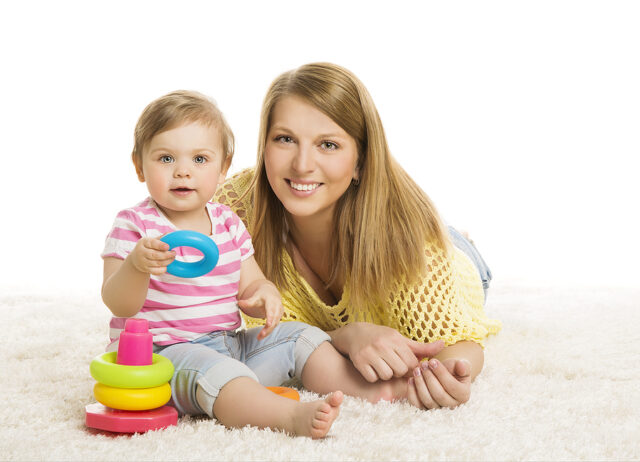
Is My Baby Meeting His Milestones?
When Do I seek Help?
Carolyn Orfahli, MS, OTR/L
You’re a new mom who’s looking forward to your baby’s first mommy & me class. Around the room babies are sitting, facing their mothers, and playing “peak a boo” with colorful scarves. Your baby isn’t able to sit yet. You start to wonder if your child should be sitting like his peers. This is not something you foresaw to be a concern. You’re a pro mom, you’ve been acing it for the past 7 months. Your baby eats well and sleeps through the night, but sitting, who even thinks about it?
Occupational therapists (OT) are experts in developmental milestones that begin in infancy. These milestones, occur at specific windows of time to progress your baby throughout development. Milestones help integrate primitive reflexes and keep your baby playing and feeding age-appropriately.
As a mother, you aren’t supposed to inherently know about when these milestones occur. Luckily, your pediatrician goes over a list of milestones at each well visit. Your pediatrician may ask: “Is your child rolling?” or “Is your child pointing?” At a glance these questions may seem like easy yes or no questions. However, if you think about it, does anyone speak about how excited they are that their baby is rolling?
You may answer yes to the milestone questions at the appointment. That afternoon, while playing with your baby, you notice that your baby is only rolling to his left and is only using one hand to reach for toys. This observation may be nothing of concern or your baby may benefit from OT.
What do you do? With any concern, always consult with your pediatrician first. They may advise to seek OT right away, the earlier your baby is in therapy, the quicker they progress. Sometimes, your pediatrician may advise to “wait and see.” Now, the power is in your hands. If you are worried about your baby, you can decide to seek therapy instead of waiting. You are the expert on your baby. You are taking notice to how he plays compared to his peers. If your OT recommends therapy, now your baby has the best possible chance to get on track. Once your child is evaluated, your OT may recommend physical or speech therapy instead. If your baby doesn’t need therapy, your baby is doing well and your mind is an ease.
When an OT evaluates your baby’s skills, they are analyzing each of your baby’s body movements, checking their primitive reflexes and overall strength. For example, in regard to rolling: Is your baby rolling to his right and to his left? Is your baby rolling from their back to belly and from his belly to back?
During OT sessions, you’ll receive guidance on stretches, positioning, exercises and different activities to help your baby achieve his milestones.
The developmental milestones occur within a range of months. As a general rule, OTs give the baby time to “catch-up” before suggesting therapy. Each baby’s case is specific, whether they were born prematurely, have a muscle tightness or diagnosis will dictate the urgency of initiating OT.
The following is a list of milestones that your baby should be able to do by each age. Other milestones related to standing/walking and speech/communication are not listed; consult with a physical or speech therapist accordingly.
OTs address the following:
2-3 months:
• Lifts head briefly during tummy time
• Brings hands to mouth
• Visually tracks toys
4-5 months:
• Bears weight on forearms during tummy time
• Rolls from back to belly and belly to back
• Reaches and grasps toys
6 months:
• Sits unsupported
• Grasps small objects using all their fingers
8 months:
• Crawls on hands and feet
12 months:
• Pincer grasp with index finger and thumb with both hands
• Self-feed finger foods
• Transitions between all positions: laying down, sitting, crawling
Additionally, if your baby seems floppy, rigid or seems to exhibit sensory seeking behaviors (rocking or spinning) or sensory avoidant behaviors (refuses to touch certain textures in food or play), an OT may be of assistance. When in doubt, seek OT out!
Carolyn Orfahli, MS, OTR/L is a Pediatric Occupational Therapist and founder of MamaBear OT. She has extensive experience working at NYU Rusk Rehab pediatric outpatient unit and in Early Interventions/School settings. She can be reached at: (718) 490-5045.



